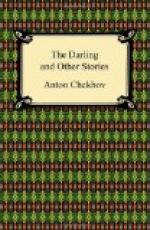“Well, but I spend two thousand five hundred a month,” he said. “I tell you again, dear: you have just as much right to spend it as I or Fyodor. Do understand that, once for all. There are three of us, and of every three kopecks of our father’s money, one belongs to you.”
But Nina Fyodorovna did not understand, and her expression looked as though she were mentally solving some very difficult problem. And this lack of comprehension in pecuniary matters, always made Laptev feel uneasy and troubled. He suspected that she had private debts in addition which worried her and of which she scrupled to tell him.
Then came the sound of footsteps and heavy breathing; it was the doctor coming up the stairs, dishevelled and unkempt as usual.
“Ru-ru-ru,” he was humming. “Ru-ru.”
To avoid meeting him, Laptev went into the dining-room, and then went downstairs to his own room. It was clear to him that to get on with the doctor and to drop in at his house without formalities was impossible; and to meet the “old brute,” as Panaurov called him, was distasteful. That was why he so rarely saw Yulia. He reflected now that the father was not at home, that if he were to take Yulia Sergeyevna her parasol, he would be sure to find her at home alone, and his heart ached with joy. Haste, haste!
He took the parasol and, violently agitated, flew on the wings of love. It was hot in the street. In the big courtyard of the doctor’s house, overgrown with coarse grass and nettles, some twenty urchins were playing ball. These were all the children of working-class families who tenanted the three disreputable-looking lodges, which the doctor was always meaning to have done up, though he put it off from year to year. The yard resounded with ringing, healthy voices. At some distance on one side, Yulia Sergeyevna was standing at her porch, her hands folded, watching the game.
“Good-morning!” Laptev called to her.
She looked round. Usually he saw her indifferent, cold, or tired as she had been the evening before. Now her face looked full of life and frolic, like the faces of the boys who were playing ball.
“Look, they never play so merrily in Moscow,” she said, going to meet him. “There are no such big yards there, though; they’ve no place to run there. Papa has only just gone to you,” she added, looking round at the children.
“I know; but I’ve not come to see him, but to see you,” said Laptev, admiring her youthfulness, which he had not noticed till then, and seemed only that day to have discovered in her; it seemed to him as though he were seeing her slender white neck with the gold chain for the first time. “I’ve come to see you . . .” he repeated. “My sister has sent you your parasol; you forgot it yesterday.”
She put out her hand to take the parasol, but he pressed it to his bosom and spoke passionately, without restraint, yielding again to the sweet ecstasy he had felt the night before, sitting under the parasol.




